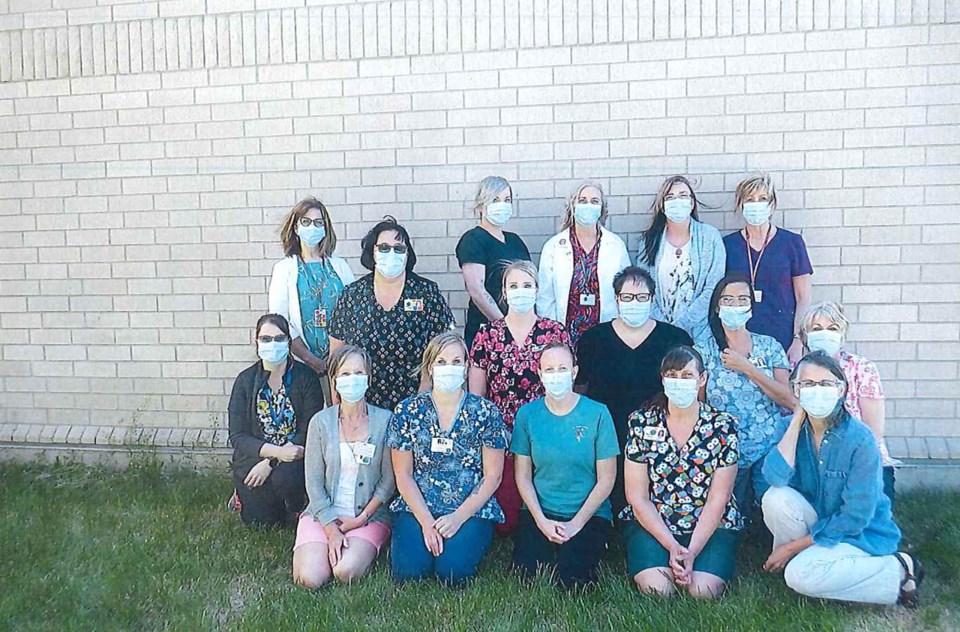The staff members at Estevan Area Home Care are a dedicated and compassionate group, regardless of whether they’re working during a pandemic or servig the community during more traditional times.
Glenda Fichter, who is a nursing supervisor, is responsible for the southeast area, which includes Midale, Lampman, Oxbow and Gainsborough, in addition to Estevan.
“Home care has many services available, so we’ve got case management, nursing, personal care, respite care, homemaking, Meals on Wheels, volunteer services and palliative care,” Fichter told the Mercury.
About 15 nurses work in the Estevan office, and a half dozen more are in the rural areas. The Estevan office has 52 staff in total, including office administrators, case management, continuing care assistants and a palliative care co-ordinator.
Home care has around 310 patients in the southeast corner, who benefit from the case management, nursing and other services. An ambulatory clinic is run by home care, with 230 patients passing through the door in April.
St. Joseph’s Hospital has been very co-operative during the past couple of months, as home care didn’t want clients to enter the hospital for the ambulatory clinic.
“St. Joe’s was able to provide accommodation in the … foundation wing, and clients were able to come in there without accessing the facility, so they could stay safe that way. We’ve definitely had to work with St. Joe’s.”
Home care also has a large number of volunteers for such services as Meals on Wheels, in which people from the community deliver meals to seniors and others. The program is led by volunteer co-ordinator Debbie Augey.
“She’s always looking for volunteers. We normally do friendly visits and palliative visits and Meals on Wheels, but during this COVID, we are only providing Meals on Wheels delivery right now, but we are still always looking for volunteers,” said Fichter.
The Meals on Wheels volunteers have to be under the age of 65. They’re also accepting high school and university students who want to help out.
“There’s been some changes to make it more safe, and a lot of the deliveries are now just being put out on people’s front steps so that the volunteers are safe. There have been changes there to protect the volunteer and the client.”
Staff members with Estevan Area Home Care have adapted well to the challenges associated with COVID-19.
“There are so many changes coming through from provincial direction and policies, that there’s been a lot of huddles needed, and a review of safety and work standards to make sure everyone is safe and that we have the proper equipment to be safe,” said Fichter.
Home care staff have had the personal protective equipment they need to stay safe.
During the first part of the outbreak, home care was providing critical care, which involves medical issues that would require immediate attention. For other patients, they were making phone calls to ensure they’re all right.
If there are changes or deteriorations in a patient’s health, they are encouraged to call in, and home care would look at a visit.
“We do screen all of our clients prior to visiting them in their homes, and they’re very understanding with that.”
Effective May 19, medium-risk clients could have in-person visits. And home care is starting to open up things that are still considered a need, but weren’t absolutely critical.
If people are symptomatic for COVID-19, they are asked to go to the testing site if they are able, and if not, home care has been supporting that testing.
Safety has also been a big emphasis of home care’s services in recent weeks, so they have done a lot of work to make sure they respond to any incidents or concerns from workers. There have been huddles and safety talks and discussions to manage the day to day concerns that can pop up.
Her manager, Lisa O’Dell has also done a good job of providing leadership and support throughout this process from the Weyburn office.
The SHA has provided resources for workers that has been appreciated as well.
Fichter said home care is an important service because they have a philosophy that people can retain greater independence and control over their lives in their own homes, and most people prefer to be in their homes.
“So if we can support that, that’s just a big key piece for home care. Even in our pamphlet, we have it highlighted that home care is not intended to take over those things that clients are able to do for themselves, or replace existing support.”
The dedicated team at home care has pulled together. There was some anxiety at the start of the pandemic, but it’s been a big team effort thanks to the efforts of all the departments.




